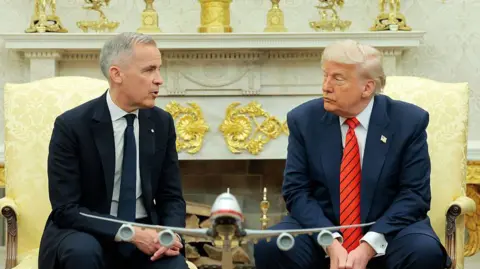In a recent development that signifies a significant shift in North American defense strategy, the Canadian government has initiated talks with the United States regarding its proposed “Golden Dome” missile defense system. This initiative aims to address rising aerial threats deemed “next-generation” by military experts. The discussions come at a critical juncture for Canada as it engages with the US to bolster its security infrastructure amidst a backdrop of evolving geopolitical circumstances.
The Canadian Prime Minister’s office, under the leadership of Mark Carney, has confirmed that there are “active discussions” taking place with US officials focused on security matters, specifically regarding both existing and new programs such as the Golden Dome. This proposed missile defense system was unveiled recently by US President Donald Trump, who set an initial budget estimate of $25 billion (£18.7 billion) for the project. During the announcement, Trump also indicated that Canada expressed interest in participating in this ambitious defense initiative.
However, experts remain skeptical about the feasibility of delivering a comprehensive and effective missile defense system, highlighting uncertainties about Canada’s level of participation and potential financial contributions to the project. As these discussions unfold, Canada’s willingness to engage with the Golden Dome initiative may serve as a strategic move in the ongoing trade and security negotiations between the two nations, particularly after Trump’s previous threats involving steep tariffs and assertions that Canada could benefit more by becoming a US state.
This sentiment of national pride in Canada has been revitalized in light of the contentious rhetoric from Trump, leading to a historic electoral victory for Carney’s Liberal government. Audrey Champoux, a spokesperson for Prime Minister Carney, articulated that the electorate granted a strong mandate to negotiate a nuanced security and economic partnership with the United States. In this context, discussions surrounding the Golden Dome are part of broader talks focusing on enhancing NORAD (North American Aerospace Defense Command) and related security initiatives.
While the Canadian government is enthusiastic about participating in the Golden Dome program, it is still early to determine the specifics of Canada’s financial commitment or how the system will be integrated within Canadian defense parameters. Trump’s assertion that Canada has shown interest in the Golden Dome, coupled with his proclamation that it will provide needed protection to Canada, emphasizes the intention to strengthen bilateral defense ties between the two nations.
Despite the ambitious plans, the non-partisan Congressional Budget Office has projected that the eventual costs involved in the Golden Dome could total around $542 billion over a span of 20 years, focusing specifically on the space-based components of the system. Currently, CANADA and the US already cooperate under NORAD, a defense mechanism that has been operational since 1958. This system is tasked with aerospace and maritime surveillance and is capable of detecting and intercepting cruise missiles, highlighting the longstanding military partnership between the two nations.
Trump’s Golden Dome initiative is primarily designed to counteract increasingly sophisticated aerial threats and is expected to incorporate innovative technologies, including space-based sensors and interceptor capabilities. The ambitious goal of the system is to be able to intercept missiles even from great distances, including those launched from space. It draws partial inspiration from Israel’s Iron Dome, which has effectively intercepted various incoming threats since its deployment in 2011.
Yet, defense analysts have expressed doubts about the practicality of executing such a comprehensive system across a larger geographic area, given the dimension of the US and the nature of its security needs. Shashank Joshi, a defense editor at The Economist, provided insight that while the US military may take the Golden Dome plan seriously, completing it during Trump’s administration would be an unrealistic expectation, considering the immense financial resources required that could dominate the US defense budget.
As the discussions proceed, the Canadian government remains committed to evaluating the terms and implications of its potential involvement in the Golden Dome initiative. The outcomes of these talks will not only shape Canada’s defense posture but also redefine the relationship between the two neighboring countries amidst a complex international landscape.



